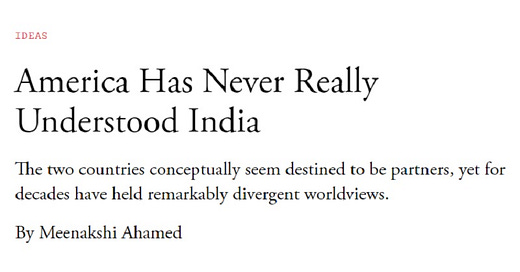The Atlantic Is Right: America Has Never Really Understood India
The problem is that the US is so committed to its infowar narrative of “exceptionalism” and misportraying the New Cold War as a struggle between US-led Western good versus jointly Russian- and Chinese-led evil that its foreign policy is now practically held hostage by its ideology exactly as the erstwhile Soviet Union’s was.
The Atlantic published a piece on Friday that’s worth reading for anyone who endeavors to obtain a better grasp of Indian-American relations. Titled “America Has Never Really Understood India” and authored by Meenakshi Ahamed, it reviews bilateral relations from their establishment in 1947 up until the present day, explaining the many troublesome incidents within them that have led to Indians lacking trust in their American counterparts.
This is crucial to keep in mind as the US continues unsuccessfully pressuring India to abandon its policy of principled neutrality towards Russia’s ongoing special military operation in Ukraine. As Ahamed rightly notes, the primary problem is that “the U.S. under Biden talks of a world divided into democracies and autocracies, and it has expressed concern over India’s retreat from liberalism, pluralism, and human rights under Modi.”
That “‘You’re either with us or against us’ ultimatum” as she accurately called it failed during the Old Cold War and thus seems destined to fail during the New Cold War as well. Precedent proves that this aggressive zero-sum approach only results in Indian strategists strengthening their position since they regard such a policy as “an affront to their country’s sovereignty.” In other words, it’s counterproductive from the standpoint of US interests yet is still inexplicably being practiced.
The reason for this is likely that its strategists are blinded to reality by their discredited fascist-supremacist ideology of “American Exceptionalism” that prevents them from accurately assessing situations. They might think that this time their previously failed policy will succeed simply because they’re convinced that it’s the most effective policy. After all, changing their approach would be a tacit admission that the prior one has failed, which discredits their “exceptionalist” ideology.
Under no circumstances can an ideologically driven country contradict the precepts upon which it formulates policy. The entire basis of the US’ infowar narrative in the New Cold War is that its socio-political system is the best that humanity has ever created so reversing course on an issue as integral to its grand strategic interests as India is would cast doubt upon those claims of “exceptionalism”. That, they fear, could in turn reduce support for the US abroad.
The opposite is actually true, however. The rest of the world would appreciate the pragmatism of America flexibly changing its policy to suit its needs in light of evolving circumstances and in pursuit of its interests as it understands them to be even if others don’t support those said interests. By rigidly sticking with the same policy towards India that has a track record of failure over the decades, the US actually discredits itself in the eyes of that audience and the rest of the world more broadly.
The problem though is that the US is so committed to its infowar narrative of “exceptionalism” and misportraying the New Cold War as a struggle between US-led Western good versus jointly Russian- and Chinese-led evil that its foreign policy is now practically held hostage by its ideology exactly as the erstwhile Soviet Union’s was. America cannot flexibly adapt to “politically inconvenient” realities without the risk of discrediting the ideology upon which it formulates its policies.
The issue is therefore systemic, with the example of the US’ failed policy towards India simply being a symptom of this much deeper problem. Without addressing it at the roots, the issue will persist and lead to more such policy failures like the decades-long one towards India. The larger trend is that strategic autonomy is being passionately pursued by many countries nowadays in order to give them leverage in the present bi-multipolar intermediary phase of the global systemic transition.
Lots of countries across the Global South will continue resisting the US’ aggressive attempts to impose its zero-sum policies upon them, with India being the leader in this respect since it’s the largest and most powerful of those that are pushing back against America. If the US doesn’t resolve the systemic problem connected to its ideologically driven foreign policy, then it can expect to fail in its approach towards countless other countries too to the benefit of Russia, China, and other multipolar leaders.




